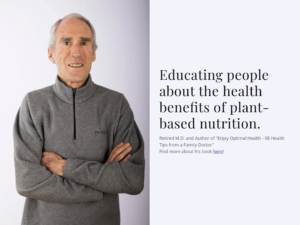 Here’s the latest health column by Dr. Greg Feinsinger. Champion of Whole Food Plant Based Living and righteous person.
Here’s the latest health column by Dr. Greg Feinsinger. Champion of Whole Food Plant Based Living and righteous person.
One way your body can get thrown out of balance, resulting in disease, is intake of environmental toxins. Dr. Neal Barnard’s recent book “Your Body in Balance, The New Science of Food, Hormones, and Health,” has a chapter about avoiding environmental chemicals.
One chemical Dr. Barnard talks about is BPA (bisphenol A), which has been linked to diabetes, heart disease, childhood obesity, and liver disorders. In men, BPA can cause hormonal changes that result in infertility, loss of libido, and erectile disfunction. In women, BPA results in higher estrogen levels and polycystic ovary syndrome ((PCOS). BPA is found in the lining of certain canned foods (where it leaches into the food), and in reusable plastic bottles. It is also found in thermal paper used for items such as credit card receipts and airplane boarding passes, and it passes through the skin of your hands and into your bloodstream.
Phthalates are used to make plastic flexible and are also used in personal care products such as soaps, shampoos, and nail polish. Phthalates dissolve in anything fatty such as milk, butter, meat, and cheese, and according to Dr. Barnard “they abound in fast foods.” In children, phthalates have been associated with conditions such as developmental and behavioral problems, pre-diabetes, high blood pressure, and allergies. In adults they have been linked to diabetes.
The University of London’s Center for Toxicology found that thirty of thirty-seven pesticides studied had hormonal effects on human cells. DDT is a is known endocrine disruptor that has been linked to problems such as menstrual disorders, infertility, low birth weight, abnormal thyroid function, and increased cancer risk. Fortunately, DDT was banned in 1972 but unfortunately, it is still present in our environment.
The leading weed killer is Roundup, which acts like an estrogen in humans. The WHO calls it a probable carcinogen, raising the risk the blood cancer non-Hodgkin’s lymphoma. The second-leading herbicide in the U.S. is atrazine, which is used as a weed killer for corn and sorghum (used as animal feed) crops. There is concern that atrazine causes low birth weight.
PCBs are synthetic chemicals banned in the U.S. in 1977, but they persist in our environment. They end up in fatty fish, dairy products, meat, and eggs, and are present in the breast milk and tissues of many humans. PCBs can affect the immune, reproductive, nervous, and endocrine systems and can cross the placenta and cause cognitive problems in babies.
Dioxins remain in humans and other animals for years, and can affect immune, reproductive, nervous, and endocrine systems. Citric acid has an innocuous-sounding name but is made using a fermentation process with the mold Aspergillus. It is used by food manufacturers and ends up in small amounts in many foods, where it has been linked to migraine headaches, allergic, and autoimmune reactions. Hormones are often used in meat and dairy production. Dr. Barnard cites the example of beef, where testosterone, estradiol, progesterone, and three synthetic hormones are often used via implanted ear pellets to gain more meat with less feed.
Unfortunately, it’s almost impossible to avoid some environmental toxin exposure these days, but in trying to do your best to do so it’s important to know this: Whether we’re a farm animal or a human, these toxins are stored in our muscle and fat. It we eat at the top of the food chain by eating meat, dairy, or seafood, we get several times the amount of these toxins compared to eating only plants, at the bottom of the food chain. And when you shop for plant-based foods, buy organic if you can (probably not necessary if it’s something with a thick peel such as a banana or avocado). If the label says “100% organic” that indicates the product contains only organic ingredients. “Organic” means that 95% of the ingredients are organic. “Made with organic ingredients” means at least 70% of the ingredients are organic.
Leave a Reply